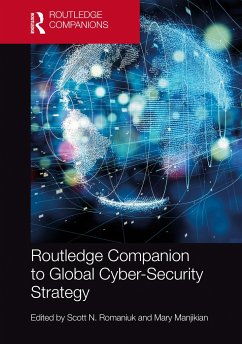Routledge Companion to Global Cyber-Security Strategy
Herausgeber: Romaniuk, Scott N.; Manjikian, Mary
Routledge Companion to Global Cyber-Security Strategy
Herausgeber: Romaniuk, Scott N.; Manjikian, Mary
- Broschiertes Buch
- Merkliste
- Auf die Merkliste
- Bewerten Bewerten
- Teilen
- Produkt teilen
- Produkterinnerung
- Produkterinnerung
This companion provides the most comprehensive and up-to-date comparative overview of the cyber-security strategies and doctrines of the major states and actors in Europe, North America, South America, Africa and Asia.
Andere Kunden interessierten sich auch für
![The Routledge Companion to Environmental Planning The Routledge Companion to Environmental Planning]() The Routledge Companion to Environmental Planning307,99 €
The Routledge Companion to Environmental Planning307,99 €![Routledge Companion to Intelligence Studies Routledge Companion to Intelligence Studies]() Routledge Companion to Intelligence Studies318,99 €
Routledge Companion to Intelligence Studies318,99 €![Cyber Security Education Cyber Security Education]() Cyber Security Education58,99 €
Cyber Security Education58,99 €![Cyber Security Education Cyber Security Education]() Cyber Security Education195,99 €
Cyber Security Education195,99 €![Conflict in Cyber Space Conflict in Cyber Space]() Conflict in Cyber Space227,99 €
Conflict in Cyber Space227,99 €![Cyber Insecurity Cyber Insecurity]() Cyber Insecurity101,99 €
Cyber Insecurity101,99 €![Theorising Cyber (In)Security Theorising Cyber (In)Security]() Noran Shafik FouadTheorising Cyber (In)Security198,99 €
Noran Shafik FouadTheorising Cyber (In)Security198,99 €-
-
-
This companion provides the most comprehensive and up-to-date comparative overview of the cyber-security strategies and doctrines of the major states and actors in Europe, North America, South America, Africa and Asia.
Hinweis: Dieser Artikel kann nur an eine deutsche Lieferadresse ausgeliefert werden.
Hinweis: Dieser Artikel kann nur an eine deutsche Lieferadresse ausgeliefert werden.
Produktdetails
- Produktdetails
- Verlag: Routledge
- Seitenzahl: 658
- Erscheinungstermin: 29. Januar 2021
- Englisch
- Abmessung: 246mm x 174mm x 35mm
- Gewicht: 1152g
- ISBN-13: 9780367024239
- ISBN-10: 0367024233
- Artikelnr.: 60006974
- Herstellerkennzeichnung
- Libri GmbH
- Europaallee 1
- 36244 Bad Hersfeld
- gpsr@libri.de
- Verlag: Routledge
- Seitenzahl: 658
- Erscheinungstermin: 29. Januar 2021
- Englisch
- Abmessung: 246mm x 174mm x 35mm
- Gewicht: 1152g
- ISBN-13: 9780367024239
- ISBN-10: 0367024233
- Artikelnr.: 60006974
- Herstellerkennzeichnung
- Libri GmbH
- Europaallee 1
- 36244 Bad Hersfeld
- gpsr@libri.de
Scott N. Romaniuk is a Postdoctoral Research Fellow in Security Studies at the China Institute, University of Alberta, Canada, and a Visiting Fellow at the International Centre for Policing and Security, University of South Wales, UK. Mary Manjikian is Associate Dean of the Robertson School of Government at Regent University, USA.
Foreword: Global cybersecurity in the 21st century; Introduction:
cybersecurity strategy and policy in a comparative context (Mary Manjikian
and Scott N. Romaniuk); Part I: Europe; 1 Securing the kingdom's
cyberspace: cybersecurity and cyber intelligence in Spain (Rubén Arcos); 2
Albania's cybersecurity pivot: between western architectures and great
power competition (Alexander Fotescu and Mihai Chihaia); 3 Armenian
national policy in cyber space: toward a global cyber security architecture
(Ruben Elamiryan); 4 Czech Republic: a new cyber security leader in Central
Europe (Lucie Kadlecová and Michaela Semecká); 5 Cybersecurity in the
French Republic (Amber Darwish and Scott N. Romaniuk); 6 Germany's
cybersecurity strategy: confronting future challenges (Scott N. Romaniuk
and Michael Claus); 7 Cybersecurity of Poland: legal and organizational
framework (Dominika Dziwisz); 8 Hungary: from the groundworks to an
evolving cyber security landscape (Annamária Beláz and Dániel Berzsenyi); 9
Romanian cybersecurity efforts: a work in progress (Oana-Elena Brânda); 10
Italy's cybersecurity architecture and critical infrastructure (Tommaso De
Zan, Giampiero Giacomello, and Luigi Martino); 11 Dutch cyber security
strategy (Joost Bunk and Max Smeets); 12 Norwegian cybersecurity: a
small-state approach to building international cyber cooperation (Lars
Gjesvik); 13 Seeking a new order for global cybersecurity: the Russian
approach to cyber-sovereignty (Ilona Stadnik); 14 Slovakia: the Tatra Tiger
without teeth (Aaron T. Walter); 15 Slovenia: a fragmented cyber security (
Laris Gaiser); 16 In the line of Russian aggression: Ukraine, hybrid
warfare, and cyber security defense (Olya Zaporozhets and Oleksiy Syvak);
17 United Kingdom: pragmatism and adaptability in the cyber realm (Tim
Stevens); 18 European Union: policy, cohesion, and supranational
experiences with cybersecurity (Christopher Whyte); 19 Estonia: from the
"Bronze Night" to cybersecurity pioneers (Nick Robinson and Alex Hardy); 20
NATO's evolving cyber security policy and strategy (Scott N. Romaniuk,
Alexander Fotescu, and Mihai Chihaia); Part II: Asia and Australia; 21
Japan's challenges, capabilities, and preparedness in cyberspace (Tobias
Burgers, Scott N. Romaniuk, and Cherry H. Y. Wong); 22 An effective shield?
Analyzing South Korea's cybersecurity strategy (Yangmo Ku); 23 In the line
of fire: Taiwan's legal, political, and technological cybersecurity posture
(Tobias Burgers, Moritz Hellmann and Scott N. Romaniuk); 24 Serving the
people: China's cybersecurity policy and its implications (Yu-Cheng Chen,
Tony Tai-Ting Liu, and Scott N. Romaniuk); 25 Cybersecurity in a one-party
state: policies and implications for Vietnam's economy and online freedom (
Phan Le); 26 The Philippines' cybersecurity strategy: strengthening
partnerships to enhance cybersecurity capability (Amparo Pamela, H. Fabe,
and Ella Zarcilla-Genecela); 27 Malaysia: balancing national development,
national security, and cybersecurity policy (Ahmad El-Muhammady); 28 Cyber
governance and data protection in India: a critical legal analysis (
Debarati Halder and K. Jaishankar); 29 Cyber security: a national priority
for Bangladesh (Md. Shariful Islam); 30 Managing a digital revolution:
cyber security capacity building in Myanmar (Niels Nagelhus Schia and Lars
Gjesvik); 31 Australia's cyber security: a unique opportunity (Ana Stuparu
); 32 Singapore: a leading actor in ASEAN cybersecurity (Benjamin Ang);
Part III: The Middle East; 33 Between multi-stakeholderism and cyber
sovereignty: uunderstanding Turkey's cybersecurity strategy (Tuba Eldem);
34 Israel: cyber defence and security as national trademarks of
international legitimacy (Fabio Cristiano); 35 Palestine: Whose
cybersecurity without cyber sovereignty? (Fabio Cristiano); 36 The "Silicon
Valley of the Middle East": cybersecurity, Saudi Arabia, and the path to
vision 2030 (Anwar Ouassini and Kimeu W. Boynton); 37 The Islamic Republic
of Iran's cybersecurity strategy: challenges in an era of cyber uncertainty
(Filiz Katman); Part IV: The Americas; 38 Canada's cyber security in a
globalized environment: challenges and opportunities (Kawser Ahmed); 39 The
United States: a declining hegemon in Cyberspace? (Mary Manjikian); 40
Jamaica's cybercrime and cyber-security: policies, laws, and strategies (
Suzette A. Haughton); 41 Mexico and cybersecurity: policies, challenges,
and concerns (Saúl Mauricio Rodriguez-Hernandez and Nicolás Velásquez); 42
Colombia's cybersecurity predicament: state making, strategic challenges
and the cyberspace (Florent Frasson-Quenoz and Cesar Augusto Niño González
); 43 Cybersecurity Governance in Brazil: Keeping Silos or Building
Bridges? (Louise Marie Hurel and Luisa Cruz Lobato) Part V: Africa; 44
Securitizing Cyber Space in Egypt: the Dilemma of Cybersecurity and
Democracy (Bassant Hassib and Nardine Alnemr); 45 Security through the Arab
Winter: cyber strategies in postrevolutionary Tunisia (Nabil Ouassini); 46
Cyber security in Kenya: balancing economic security and internet freedom (
James D. Fielder); 47 Cybersecurity policy in Nigeria: a tool for national
security and economic prosperity (Adewunmi J. Falode); 48 Cybersecurity in
Ghana: past, present, and future (Anwar Ouassini and Mostafa Amini); 49
Building a Cyber Fortress in Africa: uganda's cyber security capacities and
challenges (Scott N. Romaniuk and David Andrew Omona); 50 Cybersecurity in
South Africa: status, governance, and prospects (Raymond Steenkamp Fonseca
and Jo-Ansie van Wyk); 51 Algorithms of oppression? AU's cybersecurity
policy and its enforcement in Africa (Joshua Oreoluwa Akintayo); Index
cybersecurity strategy and policy in a comparative context (Mary Manjikian
and Scott N. Romaniuk); Part I: Europe; 1 Securing the kingdom's
cyberspace: cybersecurity and cyber intelligence in Spain (Rubén Arcos); 2
Albania's cybersecurity pivot: between western architectures and great
power competition (Alexander Fotescu and Mihai Chihaia); 3 Armenian
national policy in cyber space: toward a global cyber security architecture
(Ruben Elamiryan); 4 Czech Republic: a new cyber security leader in Central
Europe (Lucie Kadlecová and Michaela Semecká); 5 Cybersecurity in the
French Republic (Amber Darwish and Scott N. Romaniuk); 6 Germany's
cybersecurity strategy: confronting future challenges (Scott N. Romaniuk
and Michael Claus); 7 Cybersecurity of Poland: legal and organizational
framework (Dominika Dziwisz); 8 Hungary: from the groundworks to an
evolving cyber security landscape (Annamária Beláz and Dániel Berzsenyi); 9
Romanian cybersecurity efforts: a work in progress (Oana-Elena Brânda); 10
Italy's cybersecurity architecture and critical infrastructure (Tommaso De
Zan, Giampiero Giacomello, and Luigi Martino); 11 Dutch cyber security
strategy (Joost Bunk and Max Smeets); 12 Norwegian cybersecurity: a
small-state approach to building international cyber cooperation (Lars
Gjesvik); 13 Seeking a new order for global cybersecurity: the Russian
approach to cyber-sovereignty (Ilona Stadnik); 14 Slovakia: the Tatra Tiger
without teeth (Aaron T. Walter); 15 Slovenia: a fragmented cyber security (
Laris Gaiser); 16 In the line of Russian aggression: Ukraine, hybrid
warfare, and cyber security defense (Olya Zaporozhets and Oleksiy Syvak);
17 United Kingdom: pragmatism and adaptability in the cyber realm (Tim
Stevens); 18 European Union: policy, cohesion, and supranational
experiences with cybersecurity (Christopher Whyte); 19 Estonia: from the
"Bronze Night" to cybersecurity pioneers (Nick Robinson and Alex Hardy); 20
NATO's evolving cyber security policy and strategy (Scott N. Romaniuk,
Alexander Fotescu, and Mihai Chihaia); Part II: Asia and Australia; 21
Japan's challenges, capabilities, and preparedness in cyberspace (Tobias
Burgers, Scott N. Romaniuk, and Cherry H. Y. Wong); 22 An effective shield?
Analyzing South Korea's cybersecurity strategy (Yangmo Ku); 23 In the line
of fire: Taiwan's legal, political, and technological cybersecurity posture
(Tobias Burgers, Moritz Hellmann and Scott N. Romaniuk); 24 Serving the
people: China's cybersecurity policy and its implications (Yu-Cheng Chen,
Tony Tai-Ting Liu, and Scott N. Romaniuk); 25 Cybersecurity in a one-party
state: policies and implications for Vietnam's economy and online freedom (
Phan Le); 26 The Philippines' cybersecurity strategy: strengthening
partnerships to enhance cybersecurity capability (Amparo Pamela, H. Fabe,
and Ella Zarcilla-Genecela); 27 Malaysia: balancing national development,
national security, and cybersecurity policy (Ahmad El-Muhammady); 28 Cyber
governance and data protection in India: a critical legal analysis (
Debarati Halder and K. Jaishankar); 29 Cyber security: a national priority
for Bangladesh (Md. Shariful Islam); 30 Managing a digital revolution:
cyber security capacity building in Myanmar (Niels Nagelhus Schia and Lars
Gjesvik); 31 Australia's cyber security: a unique opportunity (Ana Stuparu
); 32 Singapore: a leading actor in ASEAN cybersecurity (Benjamin Ang);
Part III: The Middle East; 33 Between multi-stakeholderism and cyber
sovereignty: uunderstanding Turkey's cybersecurity strategy (Tuba Eldem);
34 Israel: cyber defence and security as national trademarks of
international legitimacy (Fabio Cristiano); 35 Palestine: Whose
cybersecurity without cyber sovereignty? (Fabio Cristiano); 36 The "Silicon
Valley of the Middle East": cybersecurity, Saudi Arabia, and the path to
vision 2030 (Anwar Ouassini and Kimeu W. Boynton); 37 The Islamic Republic
of Iran's cybersecurity strategy: challenges in an era of cyber uncertainty
(Filiz Katman); Part IV: The Americas; 38 Canada's cyber security in a
globalized environment: challenges and opportunities (Kawser Ahmed); 39 The
United States: a declining hegemon in Cyberspace? (Mary Manjikian); 40
Jamaica's cybercrime and cyber-security: policies, laws, and strategies (
Suzette A. Haughton); 41 Mexico and cybersecurity: policies, challenges,
and concerns (Saúl Mauricio Rodriguez-Hernandez and Nicolás Velásquez); 42
Colombia's cybersecurity predicament: state making, strategic challenges
and the cyberspace (Florent Frasson-Quenoz and Cesar Augusto Niño González
); 43 Cybersecurity Governance in Brazil: Keeping Silos or Building
Bridges? (Louise Marie Hurel and Luisa Cruz Lobato) Part V: Africa; 44
Securitizing Cyber Space in Egypt: the Dilemma of Cybersecurity and
Democracy (Bassant Hassib and Nardine Alnemr); 45 Security through the Arab
Winter: cyber strategies in postrevolutionary Tunisia (Nabil Ouassini); 46
Cyber security in Kenya: balancing economic security and internet freedom (
James D. Fielder); 47 Cybersecurity policy in Nigeria: a tool for national
security and economic prosperity (Adewunmi J. Falode); 48 Cybersecurity in
Ghana: past, present, and future (Anwar Ouassini and Mostafa Amini); 49
Building a Cyber Fortress in Africa: uganda's cyber security capacities and
challenges (Scott N. Romaniuk and David Andrew Omona); 50 Cybersecurity in
South Africa: status, governance, and prospects (Raymond Steenkamp Fonseca
and Jo-Ansie van Wyk); 51 Algorithms of oppression? AU's cybersecurity
policy and its enforcement in Africa (Joshua Oreoluwa Akintayo); Index
Foreword: Global cybersecurity in the 21st century; Introduction:
cybersecurity strategy and policy in a comparative context (Mary Manjikian
and Scott N. Romaniuk); Part I: Europe; 1 Securing the kingdom's
cyberspace: cybersecurity and cyber intelligence in Spain (Rubén Arcos); 2
Albania's cybersecurity pivot: between western architectures and great
power competition (Alexander Fotescu and Mihai Chihaia); 3 Armenian
national policy in cyber space: toward a global cyber security architecture
(Ruben Elamiryan); 4 Czech Republic: a new cyber security leader in Central
Europe (Lucie Kadlecová and Michaela Semecká); 5 Cybersecurity in the
French Republic (Amber Darwish and Scott N. Romaniuk); 6 Germany's
cybersecurity strategy: confronting future challenges (Scott N. Romaniuk
and Michael Claus); 7 Cybersecurity of Poland: legal and organizational
framework (Dominika Dziwisz); 8 Hungary: from the groundworks to an
evolving cyber security landscape (Annamária Beláz and Dániel Berzsenyi); 9
Romanian cybersecurity efforts: a work in progress (Oana-Elena Brânda); 10
Italy's cybersecurity architecture and critical infrastructure (Tommaso De
Zan, Giampiero Giacomello, and Luigi Martino); 11 Dutch cyber security
strategy (Joost Bunk and Max Smeets); 12 Norwegian cybersecurity: a
small-state approach to building international cyber cooperation (Lars
Gjesvik); 13 Seeking a new order for global cybersecurity: the Russian
approach to cyber-sovereignty (Ilona Stadnik); 14 Slovakia: the Tatra Tiger
without teeth (Aaron T. Walter); 15 Slovenia: a fragmented cyber security (
Laris Gaiser); 16 In the line of Russian aggression: Ukraine, hybrid
warfare, and cyber security defense (Olya Zaporozhets and Oleksiy Syvak);
17 United Kingdom: pragmatism and adaptability in the cyber realm (Tim
Stevens); 18 European Union: policy, cohesion, and supranational
experiences with cybersecurity (Christopher Whyte); 19 Estonia: from the
"Bronze Night" to cybersecurity pioneers (Nick Robinson and Alex Hardy); 20
NATO's evolving cyber security policy and strategy (Scott N. Romaniuk,
Alexander Fotescu, and Mihai Chihaia); Part II: Asia and Australia; 21
Japan's challenges, capabilities, and preparedness in cyberspace (Tobias
Burgers, Scott N. Romaniuk, and Cherry H. Y. Wong); 22 An effective shield?
Analyzing South Korea's cybersecurity strategy (Yangmo Ku); 23 In the line
of fire: Taiwan's legal, political, and technological cybersecurity posture
(Tobias Burgers, Moritz Hellmann and Scott N. Romaniuk); 24 Serving the
people: China's cybersecurity policy and its implications (Yu-Cheng Chen,
Tony Tai-Ting Liu, and Scott N. Romaniuk); 25 Cybersecurity in a one-party
state: policies and implications for Vietnam's economy and online freedom (
Phan Le); 26 The Philippines' cybersecurity strategy: strengthening
partnerships to enhance cybersecurity capability (Amparo Pamela, H. Fabe,
and Ella Zarcilla-Genecela); 27 Malaysia: balancing national development,
national security, and cybersecurity policy (Ahmad El-Muhammady); 28 Cyber
governance and data protection in India: a critical legal analysis (
Debarati Halder and K. Jaishankar); 29 Cyber security: a national priority
for Bangladesh (Md. Shariful Islam); 30 Managing a digital revolution:
cyber security capacity building in Myanmar (Niels Nagelhus Schia and Lars
Gjesvik); 31 Australia's cyber security: a unique opportunity (Ana Stuparu
); 32 Singapore: a leading actor in ASEAN cybersecurity (Benjamin Ang);
Part III: The Middle East; 33 Between multi-stakeholderism and cyber
sovereignty: uunderstanding Turkey's cybersecurity strategy (Tuba Eldem);
34 Israel: cyber defence and security as national trademarks of
international legitimacy (Fabio Cristiano); 35 Palestine: Whose
cybersecurity without cyber sovereignty? (Fabio Cristiano); 36 The "Silicon
Valley of the Middle East": cybersecurity, Saudi Arabia, and the path to
vision 2030 (Anwar Ouassini and Kimeu W. Boynton); 37 The Islamic Republic
of Iran's cybersecurity strategy: challenges in an era of cyber uncertainty
(Filiz Katman); Part IV: The Americas; 38 Canada's cyber security in a
globalized environment: challenges and opportunities (Kawser Ahmed); 39 The
United States: a declining hegemon in Cyberspace? (Mary Manjikian); 40
Jamaica's cybercrime and cyber-security: policies, laws, and strategies (
Suzette A. Haughton); 41 Mexico and cybersecurity: policies, challenges,
and concerns (Saúl Mauricio Rodriguez-Hernandez and Nicolás Velásquez); 42
Colombia's cybersecurity predicament: state making, strategic challenges
and the cyberspace (Florent Frasson-Quenoz and Cesar Augusto Niño González
); 43 Cybersecurity Governance in Brazil: Keeping Silos or Building
Bridges? (Louise Marie Hurel and Luisa Cruz Lobato) Part V: Africa; 44
Securitizing Cyber Space in Egypt: the Dilemma of Cybersecurity and
Democracy (Bassant Hassib and Nardine Alnemr); 45 Security through the Arab
Winter: cyber strategies in postrevolutionary Tunisia (Nabil Ouassini); 46
Cyber security in Kenya: balancing economic security and internet freedom (
James D. Fielder); 47 Cybersecurity policy in Nigeria: a tool for national
security and economic prosperity (Adewunmi J. Falode); 48 Cybersecurity in
Ghana: past, present, and future (Anwar Ouassini and Mostafa Amini); 49
Building a Cyber Fortress in Africa: uganda's cyber security capacities and
challenges (Scott N. Romaniuk and David Andrew Omona); 50 Cybersecurity in
South Africa: status, governance, and prospects (Raymond Steenkamp Fonseca
and Jo-Ansie van Wyk); 51 Algorithms of oppression? AU's cybersecurity
policy and its enforcement in Africa (Joshua Oreoluwa Akintayo); Index
cybersecurity strategy and policy in a comparative context (Mary Manjikian
and Scott N. Romaniuk); Part I: Europe; 1 Securing the kingdom's
cyberspace: cybersecurity and cyber intelligence in Spain (Rubén Arcos); 2
Albania's cybersecurity pivot: between western architectures and great
power competition (Alexander Fotescu and Mihai Chihaia); 3 Armenian
national policy in cyber space: toward a global cyber security architecture
(Ruben Elamiryan); 4 Czech Republic: a new cyber security leader in Central
Europe (Lucie Kadlecová and Michaela Semecká); 5 Cybersecurity in the
French Republic (Amber Darwish and Scott N. Romaniuk); 6 Germany's
cybersecurity strategy: confronting future challenges (Scott N. Romaniuk
and Michael Claus); 7 Cybersecurity of Poland: legal and organizational
framework (Dominika Dziwisz); 8 Hungary: from the groundworks to an
evolving cyber security landscape (Annamária Beláz and Dániel Berzsenyi); 9
Romanian cybersecurity efforts: a work in progress (Oana-Elena Brânda); 10
Italy's cybersecurity architecture and critical infrastructure (Tommaso De
Zan, Giampiero Giacomello, and Luigi Martino); 11 Dutch cyber security
strategy (Joost Bunk and Max Smeets); 12 Norwegian cybersecurity: a
small-state approach to building international cyber cooperation (Lars
Gjesvik); 13 Seeking a new order for global cybersecurity: the Russian
approach to cyber-sovereignty (Ilona Stadnik); 14 Slovakia: the Tatra Tiger
without teeth (Aaron T. Walter); 15 Slovenia: a fragmented cyber security (
Laris Gaiser); 16 In the line of Russian aggression: Ukraine, hybrid
warfare, and cyber security defense (Olya Zaporozhets and Oleksiy Syvak);
17 United Kingdom: pragmatism and adaptability in the cyber realm (Tim
Stevens); 18 European Union: policy, cohesion, and supranational
experiences with cybersecurity (Christopher Whyte); 19 Estonia: from the
"Bronze Night" to cybersecurity pioneers (Nick Robinson and Alex Hardy); 20
NATO's evolving cyber security policy and strategy (Scott N. Romaniuk,
Alexander Fotescu, and Mihai Chihaia); Part II: Asia and Australia; 21
Japan's challenges, capabilities, and preparedness in cyberspace (Tobias
Burgers, Scott N. Romaniuk, and Cherry H. Y. Wong); 22 An effective shield?
Analyzing South Korea's cybersecurity strategy (Yangmo Ku); 23 In the line
of fire: Taiwan's legal, political, and technological cybersecurity posture
(Tobias Burgers, Moritz Hellmann and Scott N. Romaniuk); 24 Serving the
people: China's cybersecurity policy and its implications (Yu-Cheng Chen,
Tony Tai-Ting Liu, and Scott N. Romaniuk); 25 Cybersecurity in a one-party
state: policies and implications for Vietnam's economy and online freedom (
Phan Le); 26 The Philippines' cybersecurity strategy: strengthening
partnerships to enhance cybersecurity capability (Amparo Pamela, H. Fabe,
and Ella Zarcilla-Genecela); 27 Malaysia: balancing national development,
national security, and cybersecurity policy (Ahmad El-Muhammady); 28 Cyber
governance and data protection in India: a critical legal analysis (
Debarati Halder and K. Jaishankar); 29 Cyber security: a national priority
for Bangladesh (Md. Shariful Islam); 30 Managing a digital revolution:
cyber security capacity building in Myanmar (Niels Nagelhus Schia and Lars
Gjesvik); 31 Australia's cyber security: a unique opportunity (Ana Stuparu
); 32 Singapore: a leading actor in ASEAN cybersecurity (Benjamin Ang);
Part III: The Middle East; 33 Between multi-stakeholderism and cyber
sovereignty: uunderstanding Turkey's cybersecurity strategy (Tuba Eldem);
34 Israel: cyber defence and security as national trademarks of
international legitimacy (Fabio Cristiano); 35 Palestine: Whose
cybersecurity without cyber sovereignty? (Fabio Cristiano); 36 The "Silicon
Valley of the Middle East": cybersecurity, Saudi Arabia, and the path to
vision 2030 (Anwar Ouassini and Kimeu W. Boynton); 37 The Islamic Republic
of Iran's cybersecurity strategy: challenges in an era of cyber uncertainty
(Filiz Katman); Part IV: The Americas; 38 Canada's cyber security in a
globalized environment: challenges and opportunities (Kawser Ahmed); 39 The
United States: a declining hegemon in Cyberspace? (Mary Manjikian); 40
Jamaica's cybercrime and cyber-security: policies, laws, and strategies (
Suzette A. Haughton); 41 Mexico and cybersecurity: policies, challenges,
and concerns (Saúl Mauricio Rodriguez-Hernandez and Nicolás Velásquez); 42
Colombia's cybersecurity predicament: state making, strategic challenges
and the cyberspace (Florent Frasson-Quenoz and Cesar Augusto Niño González
); 43 Cybersecurity Governance in Brazil: Keeping Silos or Building
Bridges? (Louise Marie Hurel and Luisa Cruz Lobato) Part V: Africa; 44
Securitizing Cyber Space in Egypt: the Dilemma of Cybersecurity and
Democracy (Bassant Hassib and Nardine Alnemr); 45 Security through the Arab
Winter: cyber strategies in postrevolutionary Tunisia (Nabil Ouassini); 46
Cyber security in Kenya: balancing economic security and internet freedom (
James D. Fielder); 47 Cybersecurity policy in Nigeria: a tool for national
security and economic prosperity (Adewunmi J. Falode); 48 Cybersecurity in
Ghana: past, present, and future (Anwar Ouassini and Mostafa Amini); 49
Building a Cyber Fortress in Africa: uganda's cyber security capacities and
challenges (Scott N. Romaniuk and David Andrew Omona); 50 Cybersecurity in
South Africa: status, governance, and prospects (Raymond Steenkamp Fonseca
and Jo-Ansie van Wyk); 51 Algorithms of oppression? AU's cybersecurity
policy and its enforcement in Africa (Joshua Oreoluwa Akintayo); Index








